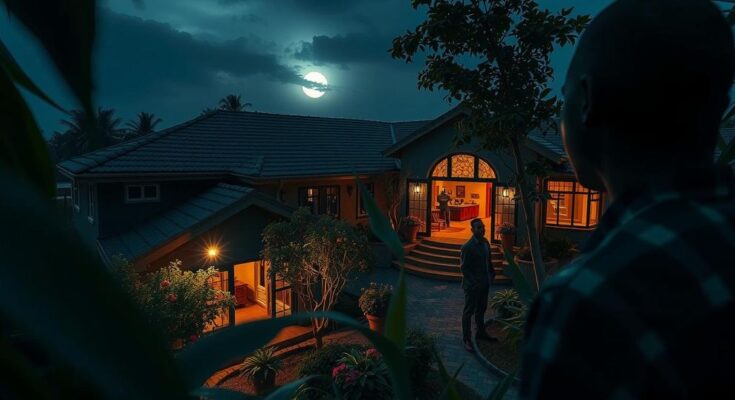South Sudan is investigating a shooting at the home of sacked spy chief Akol Koor, dismissed amid coup allegations. The incident happened in Juba, resulting in injuries but claims of Koor’s escape have been refuted. Security forces remain deployed, with the situation reported as under control.
South Sudanese authorities are conducting an investigation into a shooting incident that occurred at the residence of Akol Koor, the former chief of national intelligence who was dismissed nearly two months ago amid allegations of a coup attempt. The gunfire erupted on Thursday evening in Juba, the capital, in a setting characterized by ongoing power struggles and ethnic conflicts. Eyewitness reports indicate that the shooting persisted for approximately one hour. Following the incident, a significant military presence was noted around Koor’s home, yet normal civilian activities resumed shortly thereafter.
Although sources from the Sudans Post mentioned that Koor had been arrested following violent clashes that reportedly injured or killed numerous soldiers loyal to him, Lul Ruai Koang, spokesperson for the South Sudan People’s Defence Forces, asserted that Koor remains in his residence under surveillance. Furthermore, police spokesman John Kassara has stated that the situation is under control and urged local residents to remain vigilant. The United Nations in South Sudan issued a warning advising personnel to take cover due to the proximity of the gunfire to Koor’s location.
Historically, Koor has played a significant role in South Sudan’s security landscape, having served as the head of the National Security Services since the country’s independence in 2011. His dismissal came shortly before the government postponed the country’s first-ever elections until December 2026, a decision that has sparked substantial discontent among international observers who are advocating for a smoother transition of governance, including the integration of diverse armed factions and constitutional development. The nation has had an arduous path to stability, marred by civil conflict from 2013 to 2018, resulting in a humanitarian crisis that has left the nation deeply impoverished and enduring severe socio-economic challenges.
South Sudan has faced persistent instability since it gained independence from Sudan in 2011, primarily due to political power struggles and ethnic divisions that have often escalated into violence. The civil war between President Salva Kiir’s forces and those loyal to his then-deputy Riek Machar resulted in devastating casualties and widespread displacement. The political landscape remains fraught with tension, highlighted by the dismissal of key leaders and the ongoing presence of severely underfunded military and security forces. The triggers of these conflicts range from attempted coups to the postponement of significant elections, which are critical for establishing a functional democratic governance structure.
The investigation into the shooting at the former intelligence chief’s home underscores the continuing volatility in South Sudanese politics. The situation reflects deeper issues surrounding security, governance, and the implications of political dismissals and unrest. As the international community remains watchful, the nation’s path to stabilization hinges on effective management of its political transitions and resolving the underlying ethnic and power conflicts that plague its governance.
Original Source: www.rfi.fr




